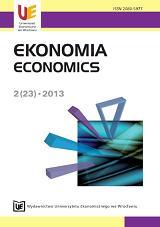Rozwój lokalny i regionalny po kryzysie
Local and regional development after the crisis
Author(s): Beata SkubiakSubject(s): Economy
Published by: Wydawnictwo Uniwersytetu Ekonomicznego we Wrocławiu
Keywords: financial crisis; economic crisis; regional development; local development; crisis effects
Summary/Abstract: The world is influenced by a deep and prolonged economic slowdown, which has been called the “great recession”. In comparison to the Great Depression of 1929-1933 and previous economic shocks, the current recession takes place in economically and financially integrated world. The ways of dealing with the crisis are different depending on the country and its decision-making level (the central government or local government). The impact of the crisis on different regions is certainly not the same and to a large extent it depends on the national economic and possessed sectoral structure. In the short term crisis effects will influence more regions with an old economic structure which is dominated by the manufacturing sector. However, in the long-term crisis effects can vary in different regions. Since 2009 to the present there have been conducted several studies examining the influence of the crisis on the cities and regions. Some studies analyze a certain sector, for example the real estate markets, the phenomenon of housing exclusion or financial failures in urban areas. Other studies analyze the economic and social outcomes of the crisis on various European and American cities. The other try to analyze the position of local governments in the face of the economic disaster. Regions with specialized manufacturing processes can play an important role in stimulating economic growth despite external shocks, if they are well prepared to recover the balance for domestic and international demand. In the case of structurally weak regions there is a risk that the loss of jobs and businesses in a recession can lead to structurally lower levels of employment and economic activity. Moreover, the reducing employment can be a cause that these regions are more vulnerable to further cuts in public spending in order to minimize the debts in recent years. Such a situation will force the regional policy to search for the ways to increase efficiency and the quality of spent money, for example through collaboration and bottom-up approach to development which mobilize existing entities and resources in the area. It is also important that the actions taken by the state, which meant to lead to more growth cannot be at the cost of limiting the founds given for the research and development as well as innovation and human capital. However, one of the most important experience in time of crisis is to determine the scale of the economic interdependence between regions and countries, and the need for international and inter-regional cooperation and coordination to solve common problems. In addition, the crisis points at the importance of government intervention in the form of both monetary and fiscal policy as well as in minimizing the economic problems. The purpose of this paper is to answer the question of how the current financial and economic crisis will have long-term consequences for local and regional development.
Journal: Ekonomia
- Issue Year: 2013
- Issue No: 23
- Page Range: 77-91
- Page Count: 15
- Language: Polish

